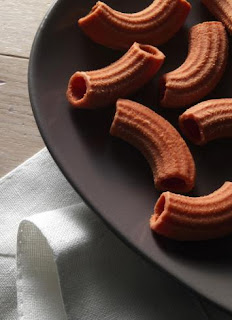 For the dough:
For the dough:3 cups 00 flour (cake flour in USA)
3 organic fresh eggs
For the Asiago filling:
1 cup grated Asiago mezzano
1 cup ricotta
Pinch of lack pepper
Pinch on nutmeg
Pinch of salt
Making the Asiago filling:
Mix with a fork the ricotta and the grated Asiago. Season with the salt, pepper and nutmeg. If the filling is dry, add some milk and olive oil.
Making the Pasta:
 Pour the flour into a bowl or table, then the eggs in the middle.
Pour the flour into a bowl or table, then the eggs in the middle.Mix with a fork to thoroughly blend the eggs with the flour. Do not add salt!
Knead the dough with your hands until it is completely smooth and consistent. If the dough is too dry, add some water; if it is too sticky, add some flour. Perfect dough should never stick to your fingers, if the dough stick to your fingers it will stick on the pasta machine, and that will be a disaster!
Continue kneading the dough by hand and break it up into little pieces.
 Set the adjustment knob of the machine to number 0, so that the two smooth rollers are fully open. Feed a piece of dough through the rollers while turning the crank clockwise.
Set the adjustment knob of the machine to number 0, so that the two smooth rollers are fully open. Feed a piece of dough through the rollers while turning the crank clockwise.Lightly dust both sides of the pasta sheet with flour and fold it in half. Feed the pasta sheet through the smooth rollers several times, until it is long and regular in shape.
Cut ravioli sheets with a ravioli cutter. Using a brush, brush with egg yolk around each ravioli if the dough is not sticking. Place 1 teaspoon filling in the center, close to expelling the air, sealing the edges properly. Make sure the edges is very well stick together, pinch hard as you would pinch a really bad child.
Boil the Asiago ravioli for about three / four minutes and mix with the sauce you like. I suggest to make the sauce for the Asiago Ravioli with cherry tomatoes, zucchini and almonds.
Click in this link for the recipe! <<<CHERRY TOMATOES, ZUCCHINI AND ALMONDS SAUCE>>>>>






























